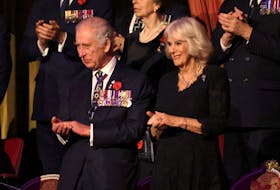
James McLeod/The Telegram
Memorial University President Gary Kachanoski spoke to the media following a meeting of the university board of regents Thursday. Kachanoski said by cutting administrative costs, travel budgets and instituting an attrition plan, the university can get by for another year without raising tuition, despite the provincial government cutting the school's operating subsidy.
But that means around 80 jobs will be eliminated at the university through attrition, with potentially more layoffs coming as the administration budgets are slashed by $4.1 million.
Kachanoski made the announcement in a presentation to the university board of regents on Thursday afternoon, as part of a broader fiscal plan to cut costs and balance the Memorial budget.
Despite what Kachanoski said, tuition fees on graduate students will go up, based on a different decision by the board of regents last year.
As the board of regents meeting was happening in R. Gushue Hall, outside student activists could be heard chanting “Keep the freeze” through a bullhorn.
But whether the tuition freeze survives beyond this year an open question.
Kachanoski said the university will balance its budget through workforce attrition, cuts to discretionary travel budget, and cuts to administration.
The overall shape of the university budget is extremely complicated, with a lot of different revenue sources and expense lines from the budget, including the university’s pension fund, capital infrastructure budget, operating expenses, and the tuition freeze.
Kachanoski said that if the current budget situation continues, the university will have a $9.8-million shortfall next year, and that will rise to $26.5 million by 2019.
“We will be presenting and discussing with our board a multi-year budgeting process, projecting forward what our needs are for revenue, and that will form the basis, of course, for future discussions with the government around a whole range of things,” he said.
As for whether tuition fees will go up in the coming years, he said it’s too soon to say, but that’s part of what the university will be talking with the government about.
The situation is further complicated by the possibility of rising costs or inflation. For example, Kachanoski said MUN buys around $100 million worth of things hit by the HST each year. With the sales tax going up by two per cent, that could eat into the budget.
Media was only allowed into the board of regents meeting for Kachanoski’s presentation. Immediately after it was over, reporters were forced to leave for all discussion and voting on agenda items. The university also forebade recording Kachanoski’s comments, or even posting about it online until after the presentation was over.
Board of regents chair Iris Petten refused to speak to The Telegram for this story, and all other board members approached by The Telegram said they were not allowed to talk.
That included vice-president Noreen Golfman, who recently drew public attention when she wrote a blog post accusing the government of spinning the budget situation and understating the effect of the budget cuts the university was facing.
At the time, she raised the possibility of increasing tuition.
“So the spin from government about Memorial having received enough to keep a tuition freeze is intolerable,” she said. “Let’s share the real facts about this and start talking about just how serious a challenge these cuts are.”
Kachanoski said that the budget moves approved Thursday will not directly impact students. The cuts will focus on things like marketing and communications, alumni affairs and public engagement.








